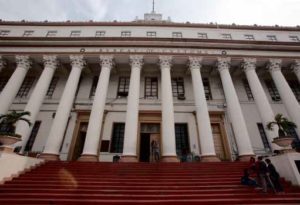BAGUIO CITY—Upland farmers who were granted agrarian lands inside forests and critical reserves like Mt. Pulag may be allowed to continue their tilling in a new deal being drafted by the government, Agrarian Reform Secretary John Castriciones said on Tuesday.
A draft joint administrative order currently being discussed by the Department of Agrarian Reform (DAR) and the Department of Environment and Natural Resources (DENR) states that occupants of forest lands who tended their crops for decades “would no longer be disturbed by the DENR,” said lawyer Luis Meinrado Pañgulayan, agrarian reform undersecretary for legal affairs.
CLOAs
The DENR and DAR have been at loggerheads over farming activities in protected woodlands. In 1998, the DENR nullified eight certificates of land pwnership award (CLOAs) issued to farming communities in the Benguet town of Kabayan in 1992.
Majority of Kabayan’s villages are within the 11,500-hectare Mt. Pulag National Park, which is home to virgin pine and mossy forests as well as endangered plants and animals like the cloud rat.
Scholars from the University of the Philippines in Los Baños have described Mt. Pulag farming as the most destructive activity threatening Luzon’s highest mountain.
As many as 15,000 CLOA-holders in many of the country’s woodlands would be affected should the DENR disfranchise them by reasserting control over 46,000 ha of occupied timberlands, said Castriciones, who was here for a yearend review of the DAR’s accomplishments.
“If it is just a forest and it was distributed to farmers, the position we have taken is that we will maintain [these farms inside timberlands] as is,” he said.
Castriciones also said the DAR was studying how to assist Ibaloy and Kankanaey farmers dwelling inside the Camp John Hay forest reserve.
Residents of Barangay Happy Hallow, recognized as the Baguio Ibaloy ancestral domain, also have farms and small rice terraces, and may qualify for CLOAs, he said after discussing the matter with Mayor Benjamin Magalong.
Not watersheds
But the agrarian reform secretary qualified that farming inside watersheds was not permissible under the agreement being forged by the Cabinet.
Castriciones distinguished forests or woodlands from watersheds or tree-populated areas which absorb or discharge rainwater toward creeks and water bodies from which communities draw potable water.
“Watersheds absolutely cannot be alienable and disposable. These lands [granted CLOAs] are not exactly in watersheds [but] in the event there are portions which are actually watersheds … and will affect the community, then that’s not negotiable …. They will be canceled and the lands would be reverted … to the care of the DENR,” Castriciones said.
He said the DAR’s latest inventory of CLOAs inside forests do not appear to be affecting watersheds and are therefore “validly distributed.”


